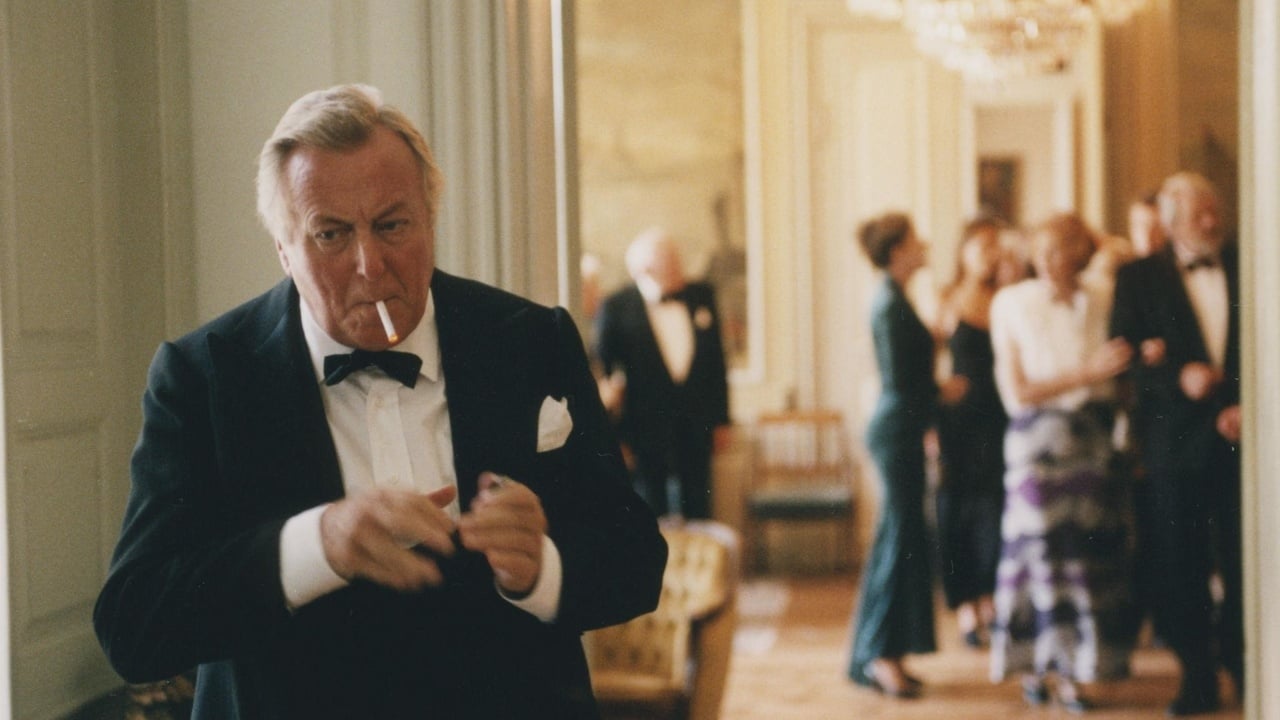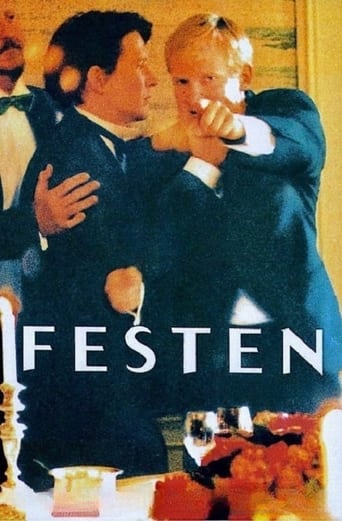

The cast and the most suitable directing style for a sad topic creates a gripping movie. The story is about a high-class family; the secrets and behaviors of its members, and how things unfold at a family union party of the Dad's 60th Birthday.The way the director/story introduces the characters is amazing if you miss a moment you might miss on some plot points. The cast is amazing and brilliant in their performance. Some scenes are bizarre and reminds one of Bunuel's The Exterminating Angel.There are lot movies made on such topic where a family secret is revealed at some party/reunion, but this movie is a lot better and different from those because is also shows(in a dark sense) how the society/close by people reacts to it.
... View MoreThe very first feature from Dogma 95 movement, Thomas Vinterberg's audacious family exposé sets its narrative entirely within a one-day spell, Christian (Thomsen), a seemingly-decorous man comes from Paris to celebrate his father Helge's (Mortizen) 60-year-old birthday at their family-run hotel in a rural Denmark, other family members and friends are also invited, including Christian's younger sister and brother, Helene (Steen) and Michael (Bo Larsen).Frenetically embracing itself to the Dogma 95 doctrines and its trimmings, the film plays out like a horror movie that anticipates the low-budget found-footage creepiness, natural lighting counterpointing its formal grandeur of the event, hand-held camera slithering around like an insidious creature from all possible approaches to observe the impending drama. Vinterberg pulls no punches from Michael's horrendous excesses, insolent, finicky and randy, a male chauvinist pig (with the plot thickening, violence and racism would in no time join up), he is egregiously obnoxious, which trenchantly conveys the impression that he might be the black sheep in the family, who could cause some riot and embarrassment to his holier-than-thou parents, that's a splendid trick to set the premise. On the other hand, a more haunting undertow trickles in concerning about Christian's twin sister Linda, who committed suicide of late in one of the hotel room's bathtub. Through a jumpy montages of actions occurring in each sibling's rooms (boosted by a brilliant idea of peeping from an angle of surveillance), Helene discovers a note Linda left in the latter's room, its context would give the final word about the dirty secrets concealed in this family.The main event of the day is the birthday banquet, Helge, a quintessential upper-crust patriarch, having a stable marriage with Else (Neumann) over 30 years, is well positioned to enjoy that particular day, before all the congratulatory mirth would uncomfortably dissipate after Christian's bomb-dropping toast, not one, not two, but three, vitriolically aiming to his parents. He is relentlessly charged, to seek out justice in his own term (also on behalf of Linda), and the guests' much subdued reaction has been palatably teased out to an almost implausibly farcical sphere, hypocrisy and self-denial run rampant whilst the celebration must go on, at least on its face value (aided by a ludicrous car-keys hiding scheme conceived by the chef). Suddenly, it reminisces of Luis Buñuel's surreal allegory THE EXTERMINATING ANGEL (1962), no one can leave the party, where moral corruption and sickening frailties are perturbingly disclosed. Vinterberg displays a shrewd discernment of the socio-psychology among his subjects, and the ensuing pay-off is uncompromisingly gripping, until the finale sets its ambiguous tone on the aftershock. What happens happens, the surviving damaged goods have to carry their bloodline no matter what, a human tragedy stems deep from the vein of human nature's vice and cruelty .The Danish cast illuminate with affecting performances galore, Thomsen as the silently-fuming Christian, Steen as the unstably nervy Helene, Moritzen as the unfazed Helge all leave indelible marks in their conflicting narrative arcs; yet, it is Neumann, who kills in the scene of her double- edged speech, such an atrociously refined poise achingly testifies that her Else, should be condemned with no less culpability than her children-molesting husband, and in her final shots, she still vainly attempts to come clean out of it, that is a truly extraordinary scene-stealer. Finally, a disconcerting gripe falls on to Bo Larsen's Michael, a shifty-looking youngest son, he is the bad seed who inherits all the deflects from his parents, and the fact that Vinterberg chooses him to stand in a moral high-ground over them does contribute to some ill-feeling of this otherwise groundbreaking feature film, a liberation from machine-bound unwieldiness and trimming down all the usual accessories, puts the thorny narrative in the centre with raw fierceness and closeness, ultimately, it hits like a sledgehammer, take that? Lars von Trier!
... View MoreFesten opens with a high-speed car race in which three siblings and other party guests are vying to arrive first at a place they all seem to desperately not want to go -- the estate of their father, relative or friend who is celebrating his 60th birthday.Through a series of vignettes following each of the siblings into their respective rooms for the weekend, their personalities are revealed, as well as some underlying information that is looming over the festivities -- the fact that they have recently lost their sister due to suicide.As characters congregate and the movie whirls through various party sequences, the celebration is punctuated by toasts in which one of the siblings brings forth highly incriminating claims against his father. The party tries to cope with this by acting like it didn't happen. Meanwhile, the head of the kitchen staff, who knows the claims to be true, conspires to steal everyone's keys, keeping them locked in the space, forced to confront what's real.After the accusation (and a few follow-ups), there is a lot of work done to preserve the myth of innocence in the family. Possibly the most wrenching depiction of this comes during the matriarch's speech, when she uses a story about the accuser's imagination in childhood to undermine the veracity of his statements, claiming that he has always been unable to distinguish fact from fiction, though she knows he is telling the truth.This movie is not for the faint of heart. It contains at least half of the bad stuff in the world: violence against women, violence in general, rape, harassment, collective and aggressive racism and pedophilia. BUT, it's totally worth watching.
... View MoreTo say The Celebration is explosive stuff is putting lightly. Thomas Vinterberg, using the 'rules' of the Dogme 95 decree - and how much he followed it to the letter may be up for debate, but hey rules were made to be broken right - takes on family dysfunction and the upper class in his native Denmark. It's the right approach, all things considered; if this were done as a 'normal' film, the acting certainly would carry it, but by everything being either hand-held in its pre-historic digital video, or in a distorted perspective (no tri-pods were used, to my understanding), there's an energy to it that can't be touched. There's real manic, nervous, anxious energy to the whole piece, even when it's just two characters sitting down to talk, like early on when Christian, sort of the main character in this ensemble, is listening to his dad (or step-dad I guess) telling him something important before festivities begin (or the one who really kicks off the central conflict - that being the one being celebrated for his 60th birthday, good old dad).It's not really important; not like, say, the bombshell that Christian drops almost carefree during his toast at this big familial engagement at this country hous, or the fact that this is taking place just days after the death of his sister by suicide. Meanwhile, other characters are dealing with things, like the volatile, abusive f*** of a brother Michael, and the other sister who is just trying to keep it together but can't understand, barely, how a party can go on like this in the first place.Tension ripples through this whole film. I can imagine, or just see, someone watching this and being put off by it. It's reckless, sloppy filmmaking in a big way - camera-work at times is jumbled and all over the place, and angles seem to jut-out with large letters. One would see this again in the couple of times Lars von Trier tried this (even Dancer in the Dark had the feel). But this is successful so much because the style is approximate, and even tries to keep up, with the emotional stakes. These characters are frayed and at best awkward with the revelations being tossed about, and some side things like, say, one of the characters bringing to the party a black taxi driver. When the party guests, led by obnoxious Michael (that actor, Thomas Bo Larsen, is incredible here by the way, if almost, probably over the top), sing a racist song at the table, with the man at right there. Yes, they're pretty much all horrible, folks! This shouldn't be funny as it is. Often, it's shocking and provocative, and is like if one took The Rules of the Game or Exterminating Angel (the latter I'm reminded of due to a moment or two where it seems like no one will be able to leave the house) and the filmmakers strip it all down until the bare, raw nerve endings are standing up, and characters puncture them one by one. There are times where it's funny just because of the tension in the room - it's not funny as in there's a punch-line, more like you need to laugh for just the relief from the nasty feelings. Other times, you can't laugh because of just how disturbing things get, like when a letter is discovered and read out loud. That scene in particular may be the best in the film: everything grinds to a halt when the truth fully, without any doubt, comes to light.It's incredible work because there's little room for subtlety here. If you're looking for BIG, this is big work, and yet on a very low-budget, super independent scale. Just as the camera-work is being performed sort of like a high-wire act, the family and friends at this gathering are on a similar edge as well, always ready to fall over with the threat (and visible appearance) of chaos and violence. Maybe in the days of Cassavetes this sort of filmmaking was possible, though even then he had tri-pods and artificial light. And because everything feels real, and real-time for the most part, it's hard not to get caught up into the action and these character's problems - even when you know you can't be on their side, or find them much sympathetic. The Celebration is cinema on fire.
... View More